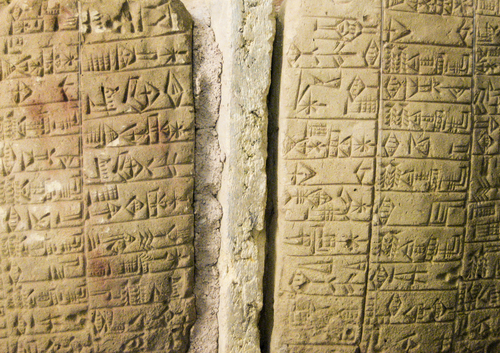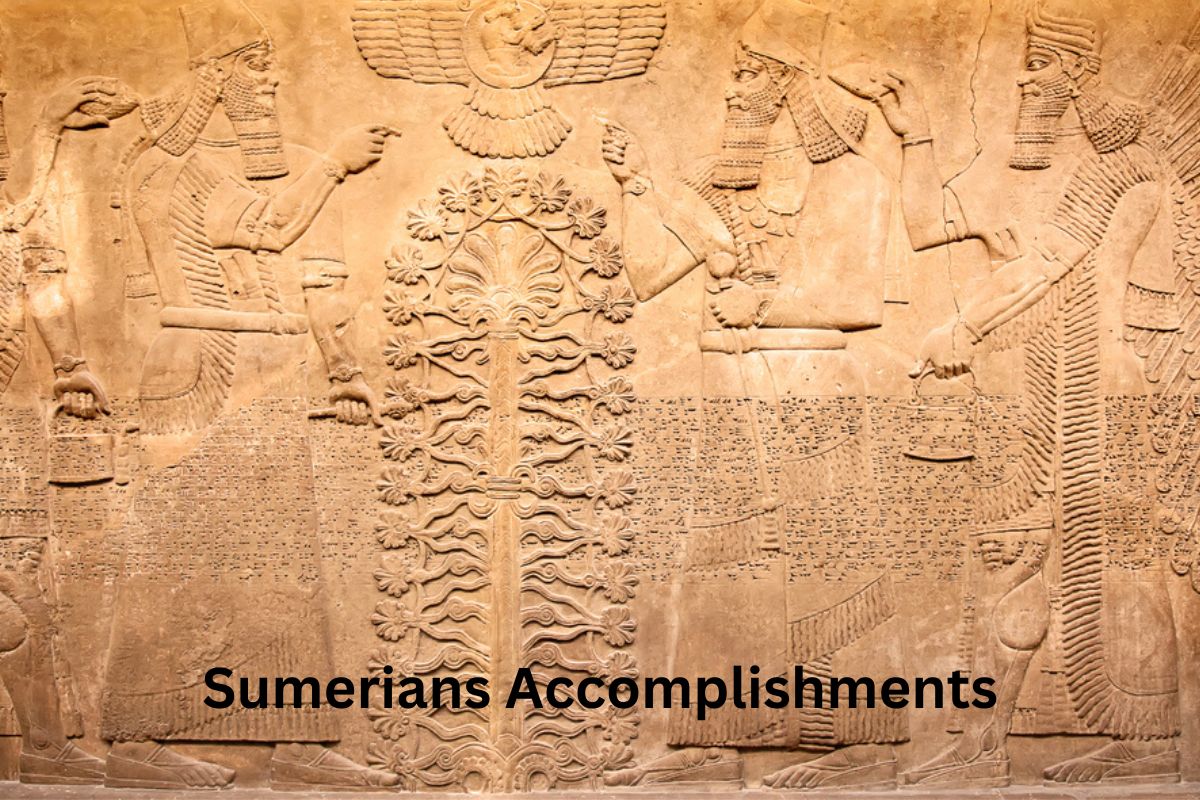The Sumerians, an ancient civilization that thrived in Mesopotamia (modern-day Iraq) from around 4000 BCE to 2000 BCE, achieved numerous significant accomplishments. They were pioneers in various fields and made lasting contributions to human civilization.
From the invention of writing and establishment of urban civilization to advancements in agriculture and mathematics, the Sumerians left an indelible mark on history.
Their architectural innovations, trade networks, calendar systems, and literary/mythological contributions further highlight their cultural and intellectual achievements.
The Sumerians’ accomplishments laid the foundation for subsequent civilizations and played a vital role in shaping the course of human development.
Accomplishments of the Sumerians
1. Invention of Writing (cuneiform)
The Sumerians developed the world’s first known writing system called cuneiform. This system involved using a stylus to make wedge-shaped marks on clay tablets.
Also Read: Facts About the Sumerians
Cuneiform was a versatile script that could represent various languages and was used for recording administrative, economic, and religious information.
It revolutionized communication and allowed for the preservation and transmission of knowledge across generations.

2. Establishment of Urban Civilization
The Sumerians were among the earliest civilizations to establish urban centers. They built remarkable city-states with organized governments, complex social structures, and monumental architecture. Cities like Uruk, Ur, and Eridu had impressive city walls, palaces, and temples.
Also Read: Timeline of the Sumerians
The emergence of urban civilization marked a shift from nomadic lifestyles to settled communities, leading to the development of specialized labor, trade, and cultural advancements.
3. Advancements in Agricultural Techniques
The Sumerians faced the challenge of a dry, arid environment in Mesopotamia. To overcome this, they developed advanced agricultural techniques. One of their most significant achievements was the creation of irrigation systems.
They constructed canals, dikes, and reservoirs to control and distribute water from the Tigris and Euphrates rivers. This allowed them to transform barren land into fertile fields, supporting a surplus of crops and a growing population.
The Sumerians also introduced new tools and techniques, such as the plow, which helped improve cultivation efficiency and agricultural productivity. Their advancements in agriculture played a vital role in sustaining urban populations and fostering economic growth.
4. Contributions to Mathematics
The Sumerians made significant contributions to the field of mathematics. They developed a number system based on the concept of 60, known as the sexagesimal system.
This system had a profound influence on subsequent civilizations, including the way we measure time and angles (360 degrees in a circle). The Sumerians also made advancements in geometry, using mathematical concepts to survey and measure land for agricultural purposes.
Additionally, they developed arithmetic techniques for calculations, including addition, subtraction, multiplication, and division.
5. Astronomical Knowledge
The Sumerians possessed advanced knowledge in astronomy. They carefully observed the movements of celestial bodies and made important astronomical records. They tracked the cycles of the moon and developed lunar calendars with twelve lunar months.
They also identified and named various planets and incorporated them into their cosmological beliefs. Sumerian astronomers laid the foundation for future astronomical observations and calculations in the region.
6. Development of Legal Systems
The Sumerians established one of the earliest known legal systems. They created comprehensive sets of laws and regulations that governed various aspects of society. Notable legal codes include the Code of Ur-Nammu and the famous Code of Hammurabi.
These legal codes covered a wide range of topics, such as contracts, property rights, marriage, inheritance, trade, and criminal offenses. They provided a framework for justice, outlining punishments and compensations for different crimes and disputes.
The Sumerian legal systems were influential and served as a basis for subsequent legal developments in Mesopotamia and other ancient civilizations.
7. Architectural Innovations (ziggurats, palaces)
The Sumerians were pioneers in architectural achievements. They constructed impressive structures, including ziggurats and palaces.
Ziggurats were massive stepped pyramids that served as religious temples. These towering structures were made of mud brick and often featured multiple tiers with a temple at the top. Ziggurats were architectural marvels and symbolized the Sumerians’ connection with their gods.
Additionally, Sumerian palaces showcased intricate designs and durable materials like mud brick and stone. These architectural innovations demonstrated the Sumerians’ engineering skills and their ability to create grand structures.
8. Creation of Trade Networks
The Sumerians developed extensive trade networks, both within Mesopotamia and with neighboring regions. They engaged in long-distance trade, exchanging goods such as textiles, metals, agricultural products, and luxury items like precious stones and timber.
Sumerian merchants traveled by land and water, using rivers and canals as trade routes. They established commercial relationships with distant lands, including the Indus Valley civilization and regions in modern-day Iran and Turkey.
These trade networks brought prosperity to the Sumerian city-states, facilitated cultural exchange, and contributed to the development of a complex market economy.
9. Calendar System
The Sumerians devised one of the earliest calendar systems. They created a lunar calendar based on the cycles of the moon. The Sumerian calendar divided the year into twelve lunar months, each consisting of approximately 29 or 30 days.
To reconcile the lunar calendar with the solar year, the Sumerians added intercalary months periodically.
Their calendar system was a significant step toward organizing time and scheduling activities. It influenced subsequent civilizations in the region, including the Babylonians and later the Hebrews.
10. Literary and Mythological Contributions
The Sumerians produced a rich body of literature, which included epic poems, hymns, and myths. One of the most famous works is the Epic of Gilgamesh, an epic poem that explores themes of heroism, mortality, and the human condition.
Also Read: Epic of Gilgamesh Facts
This epic is considered one of the earliest surviving works of literature in the world. Sumerian literature also included hymns and prayers dedicated to their gods, providing insight into their religious beliefs and rituals.
The Sumerians developed a complex mythology with a pantheon of gods and goddesses, each with their own stories and characteristics. Their literary and mythological contributions played a crucial role in shaping the religious beliefs and narratives of subsequent civilizations in Mesopotamia.
